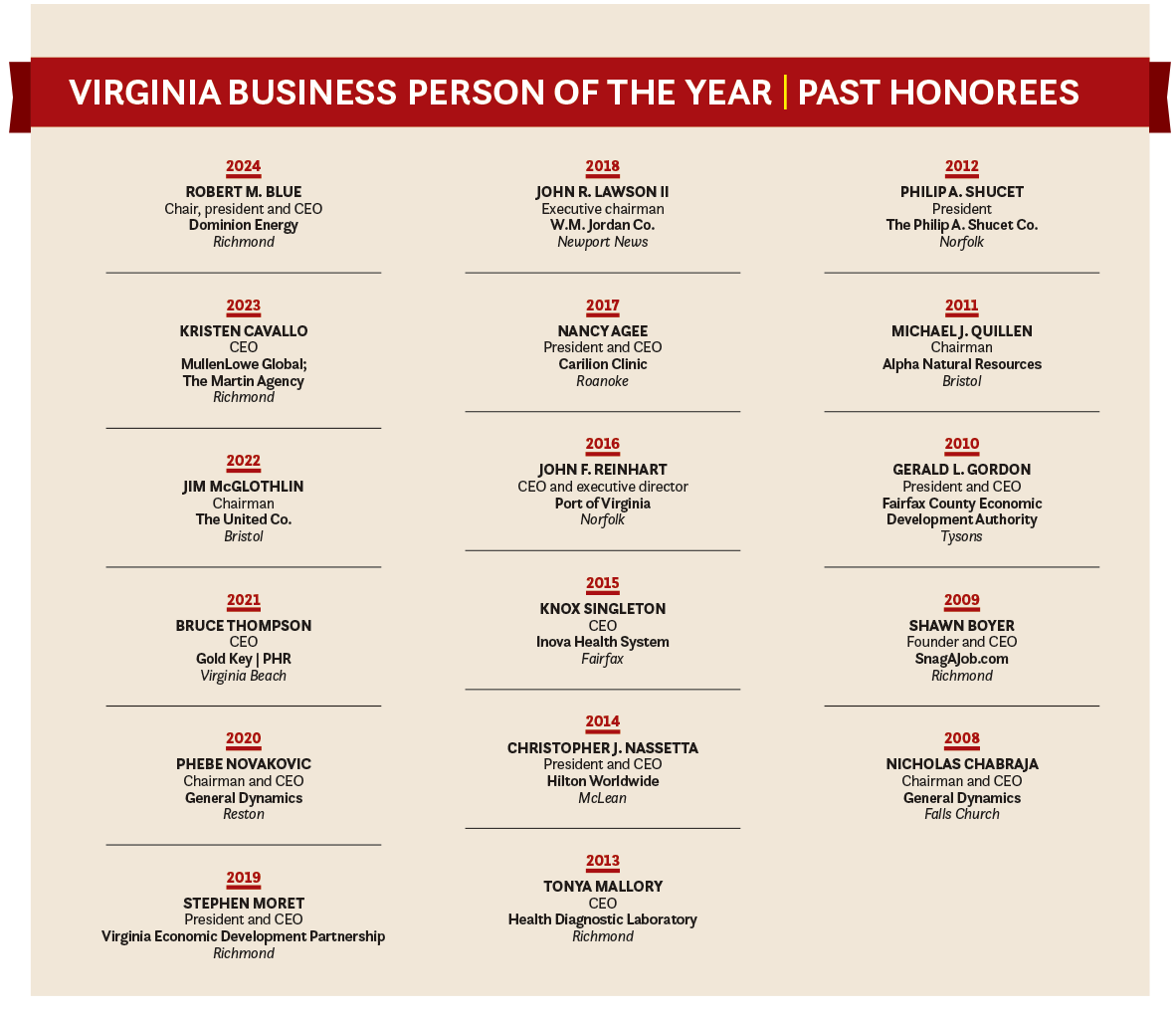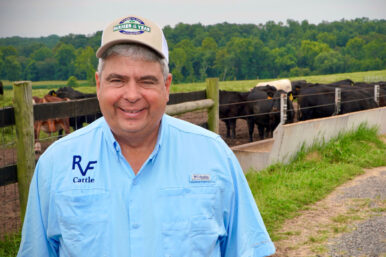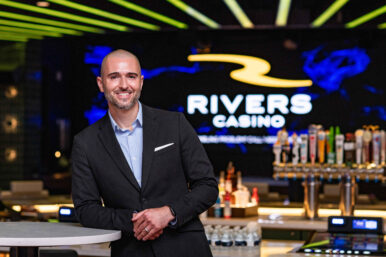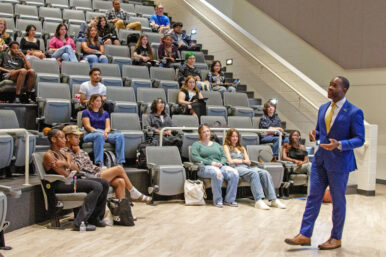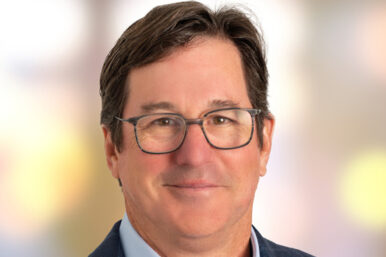Summary
- Atlantic Union CEO John Asbury is Virginia Business’ 2025 Business Person of the Year
- Grew Atlantic Union into the largest regional bank headquartered in Virginia
- Oversaw Sandy Spring Bank acquisition, expanding into Maryland, D.C., and North Carolina
John Asbury remembers the start of the pandemic in 2020 — the confusion, the fear and the uncertainty.
“That was probably one of the most frightening experiences, initially, of my career, as we all began to understand this is a pandemic. This is not something that we’ve seen in perhaps 100 years,” he says.
As CEO of Atlantic Union Bank and president and CEO of its holding company, Asbury also recognized that businesses were in jeopardy and that banks would be called upon for help. Ultimately, his bank marshaled its resources and backed far more Paycheck Protection Program loans per capita than many large, national banks — including for noncustomers whose banks were lagging. It was a risk, but Asbury says that expanding Atlantic Union’s services beyond its customer base helped bring in new clients.
It also showed him and his teammates what they were capable of. To handle all of the new business, associates throughout the bank volunteered to take calls about PPP loans and fill out paperwork, even Asbury, who fielded some calls at his home late in the evening. The bank eventually processed 11,000 loans worth a collective $1.7 billion in 2020.
“It was … a defining moment for this company,” Asbury says. “We did what needed to be done, which is very characteristic of who we are.”
In recognition of Asbury’s nearly decadelong leadership of Atlantic Union, a period when the bank has grown from a midsize Central Virginia community bank to a regional mid-Atlantic force with presences in three states and a 6.25% market share in Virginia, Virginia Business has named Asbury its 2025 Business Person of the Year.
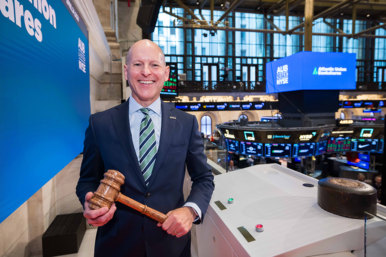
Top gun dreams
Asbury self-deprecatingly describes himself as “just a guy from Radford,” even though he’s the CEO of the state’s largest regional bank. He was born in Radford and his parents met at Radford’s high school. They married and had three sons (Asbury is the middle child).
His father was a city manager in North Carolina and Tennessee, and when Asbury was an eighth grader in 1979, the family returned to Radford.
“High school was very formative to me,” he recalls, but at first Asbury was resistant to the move, “because I had my friends. I was in junior high school, which is a very delicate time period, and I came in in the eighth grade knowing no one, and I had to settle in.”
But he soon assimilated. “By my senior year, I was president of the student body,” Asbury says. “I was an honor student. I was not valedictorian. I played sports — I was good; I was not great. I received an award when we graduated, which was essentially most well-rounded. That kind of defines me; I’m good at a lot of things. I’m probably great at nothing, but I am well-rounded, and I’m interested in a lot of things.”
The other notable thing about Asbury as a teenager was his laser focus on becoming an Air Force pilot.
“I was very focused on this for as long as I can remember,” he recalls, “going back to the second grade, when I was watching the Apollo moonshot. I was fascinated with airplanes and space, and I knew what I wanted to do.”
Asbury received his appointment to attend the U.S. Air Force Academy in Colorado Springs in 1983. “My whole life plan was playing out exactly as it should,” he says.
Until it wasn’t.
By the fall of his first year at the academy, Asbury started having trouble reading the class blackboard. “What was happening is my eyes were changing,” he explains, which placed his career plans in jeopardy.
“This was a devastating experience to me at age 18. My whole life plan was disrupted. I decided toward the end of my freshman year if I was disqualified from pilot training, if I cannot be a pilot in the Air Force, I don’t want to be staff. I thought Plan B would be to join the Navy and be a naval officer, because I was interested in that too,” Asbury recalls.
“So, I came home to Virginia Tech, and I realized that I could not transfer into their corps cadets as an upperclassman. I was going to have to start over” as a freshman, he says. “I decided I’m not going to do that. So, I chose to be a civilian student.”
Asbury enrolled at Tech as a business student and also took core academic classes at New River Community College’s night school so he could graduate within four years.
“It took me quite a long time to redefine myself,” Asbury says, “and to realize I can’t control the fact that I’m not going to be a pilot, but it is what it is. I couldn’t control what happened to me. I only could control how I responded.”
At Virginia Tech, Asbury had two other life-altering experiences: meeting his future wife and working a summer job at the Radford branch of United Virginia Bank, which later became Crestar Bank.
Meeting Wendy Sublett (now Asbury) in his junior year “changed everything,” he says. “She had transferred in after two years from Virginia Western Community College, and she obviously made an impression on me. That became serious pretty quickly, and she was clear that she didn’t want to be a military spouse and, quote, move all the time.”
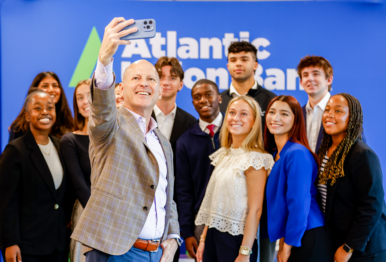
New flight plan
Meanwhile, Asbury had “stumbled across” banking as a summer job at the end of his sophomore year and had enjoyed his time at the UVB branch. He spent time learning about commercial banking and connected with David Balmer, who retired in 2003 as an executive vice president of SunTrust Banks, which purchased Crestar.
Balmer, Asbury says, “changed my life because he gave me the good advice to try to get hired by Wachovia Bank & Trust in North Carolina. It was the best training program in the South. And the original plan was [to] go down there for a few years and then we’ll hire you back in Virginia. And that’s what I did.”
Asbury joined Wachovia’s commercial banking training program, becoming a commercial credit officer, his first banking job out of college. He learned about “soundness, profitability and growth, in that order of priority,” an ethos present today at Atlantic Union, Asbury says.
“That’s how we think about our bank. The bank has to be sound, it has to be profitable. We need to grow it at a reasonable pace, not too much,” he notes. “I learned that from Wachovia.”
Along the way, Asbury earned his MBA from William & Mary and joined Bank of America, where he worked 17 years in multiple roles. This led to many corporate relocations for him and his wife.
“We probably moved, I don’t know, 14 times,” mostly with Bank of America, Asbury says. “Sadly, kids never worked for us. I’ve been married 38 years, since we graduated, and we’ve eventually concluded, all right, kids aren’t going to happen. If that’s the case, why don’t we make life an adventure?”
Asbury acknowledges that his wife, Wendy, has made sacrifices for his career, but she’s “always been supportive of me. She is my coach, she is my best friend, and I greatly appreciate her support.”
“She’s been able to do other things from a volunteerism standpoint, and she is the matriarch of the family now. I couldn’t have done this without her, and I’m in many respects a different person as a result of her. I would like to think a better person.”
Asbury progressed up the corporate ladder at Bank of America, ultimately becoming head of the bank’s Pacific Northwest region in Seattle. He then joined Regions Bank’s Fortune 500 parent company, Regions Financial, based in Birmingham, Alabama.
Although it doesn’t have branches in Virginia, Regions is one of the nation’s largest banks. After six years with Regions, where he ultimately led the bank’s business services group, Asbury says, “my wife and I concluded that we’ve done everything we wanted to do in the large bank environment.”
In 2015, Asbury made the jump to the small independent First National Bank of Santa Fe, based in New Mexico and with operations in Denver. While at Regions, he trained to become a private pilot, fulfilling his flight dream, but his new bank was not exactly wild about the idea of their new CEO flying solo, so he gave that up, Asbury notes.
However, opportunity soon knocked in Virginia.
Then known as Union Bank & Trust, the bank that would become Atlantic Union approached Asbury with an offer in 2016 to move to Richmond and become the bank’s president.
“I was not considering a change,” Asbury says. “But long story short, I was recruited. I had hit their radar. I fit the profile over there. What they were looking for [was] principally a commercial banker. I had done a lot of things during my 17 years at Bank of America and six years at Regions, and they certainly liked that I was a sitting CEO of a smaller bank, so I had exposure to that environment. And I was a native Virginian, so I suppose I checked their boxes.”
In October 2016, the Asburys arrived in Richmond.
Setting a regional course
Atlantic Union traces its roots back to Union Bank & Trust, which was founded in 1902 in Bowling Green with $2,500. By the time Asbury joined the bank in 2016, it had $8 billion in assets, with branches in the Richmond region, Fredericksburg and western Virginia. Its board was seeking a leader who could “keep the company independent and successfully cross the $10 billion asset mark,” explains Asbury, noting that regulatory costs increase dramatically for banks crossing that threshold.
Basically, he advised Union’s board, “if we want to be independent and we want to cross $10 billion, this will be a $13 [billion] or $15 billion asset bank — or it’ll simply be gone because it was too expensive.”
Asbury guided Union into its new regulatory tier, and in 2019, the bank was renamed Atlantic Union, signifying the institution’s expansion beyond Virginia’s borders. The bank has expanded further by acquiring four smaller banks under Asbury’s leadership, including its $1.3 billion purchase of Sandy Spring Bancorp in April, creating the largest regional banking franchise headquartered in the lower mid-Atlantic.
Asbury notes that Sandy Spring Bank, with more than 50 locations in the Washington, D.C., metro area, was the No. 1 regional bank based in Maryland, just as Atlantic Union is Virginia’s largest regional bank. The merger, announced in October 2024, created a bank with $38.7 billion in total assets and more than 170 branches in Virginia, Maryland, North Carolina and Washington, D.C.
Taking a page from the bank’s PPP strategy, Asbury and his second in command, Atlantic Union Bank President and Chief Operating Officer Maria Tedesco, asked employees to help take calls from Sandy Spring customers during the October systems conversion to Atlantic Union’s platform, traditionally a period with high call volume.
“We’ve had conversions that went bump in the night,” explains Tedesco, who was recruited by Asbury to join the bank as president in 2018 and has been through 30 bank conversions during her career. “But we always think about the customer first and what their experience is going to be, and we’ve gotten better at this, by the way.”
Tedesco says the Sandy Spring conversion was the smoothest in her career, and she attributes much of that success to Asbury, whom she says is “the most humble guy I have ever met,” a leader who hews to the company’s values: caring, courageous and committed.
“I have worked with so many CEOs in my time,” Tedesco notes. “I have seen it all, and I’ve had some great ones, and I’ve had some OK ones. He’s heads and tails above the rest. Why? Because he’s a transparent CEO. You’ll never, ever be surprised about anything, because he has a way of keeping people in the know.”
For 2026, Asbury says he doesn’t intend to acquire more banks and will instead focus on opening new branches in North Carolina organically.
Reaching new heights
In addition to his work at Atlantic Union, Asbury chaired the Virginia Bankers Association board in 2021, followed by serving as chairman of the Mid-Size Bank Coalition of America, and, in September, he completed his one-year term as chair of the American Banking Association, the trade organization representing the nation’s 4,500 banks. He still serves on the ABA board.
Rob Nichols, the ABA’s president and CEO, met Asbury early in his tenure at Atlantic Union and was impressed. Three years ago, Nichols approached Asbury about joining the national association’s board, as six new members must replace departing members each year.
“He’s very thoughtful, very smart, very good with people,” Nichols says. “One thing that’s very unique about him is he’s the first [ABA] chairman in 150 years who’s served at all four types of banks,” referring to Asbury’s background in large, medium, small and investment banks.
“We’ve never had that at the ABA,” says Nichols, “and he’s been absolutely fantastic.”
In 2024, the ABA and other organizations sued the Biden administration over financial regulatory policies the association asserted would hurt banks. The ABA won five out of six lawsuits, Nichols says, calling these victories “some of the most impactful actions” during Asbury’s term. Another focus was ensuring that stablecoins remain payment tools rather than vehicles for investment, which could introduce instability at small community banks, the association says.
Asbury says the Biden-era Federal Trade Commission led by Chair Lina Khan opened a “regulatory tsunami” on banks. “And while I don’t disbelieve that it was well-intended, it was overwhelming the industry and it went too far,” he says. “I believe firmly that we should have effective regulation of banking, not excessive, and I think we were being faced with excessive regulation as an industry, and the ABA was in a position to fight back, using every tool in the toolbox, including legal action.”
Along with serving on the state and national banking boards, Asbury serves on the Virginia Port Authority Commission and is now halfway through his second four-year term. Learning about the Port of Virginia’s functions and factors like tariffs and labor unions was challenging, but Asbury appreciates the experience.
“I felt at first like I was listening to a foreign language,” Asbury jokes. “I do speak the language now. I hope Virginians appreciate what a fine organization that [the Port of Virginia] is for the commonwealth, how well-run it is, and how important it is for the Virginia economy.”
Although Asbury acknowledges thinking about work outside of work, he enjoys running through Richmond neighborhoods, an activity he shared with his Italian water dog, Mozzi, who died last year.
Although Asbury and his wife miss Mozzi, “there will be another dog in our future,” he says. “Now the big debate is whether we should go puppy or rescue.”
Another benefit of living in Richmond, Asbury says, is being closer to Radford and his parents, who are now in their late 80s.
“In the end, I am a native Virginian, and I’m a proud Virginian, and that’s why I love the opportunity that we have had to bring back Virginia’s bank,” Asbury says. “We are now more than Virginia’s bank, to be clear, with respect to our markets in Maryland and North Carolina. But you know, this is where it started, right? And this is my home state.”
